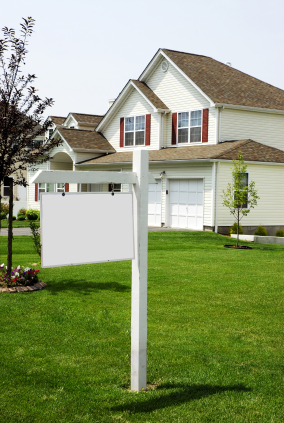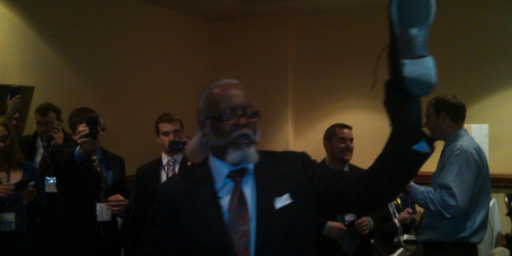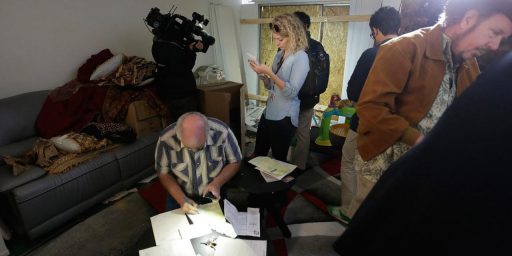Subsidizing Home Ownership
 Ezra Klein jumps on a growing meme the home ownership isn’t all it’s cracked up to be and that the government should stop subsidizing it.
Ezra Klein jumps on a growing meme the home ownership isn’t all it’s cracked up to be and that the government should stop subsidizing it.
He points to Paul Krugman, who argues in today’s NYT that it’s time to rethink our decades-long bipartisan consensus that home ownership should be encouraged. While everyone stresses the advantages of owning your own home, like building equity and creating a stake in one’s community, not enough emphasis is placed on the disadvantages.
- If housing prices fall, you can lose money
- The cost and difficulty of selling a house makes it harder to move for a new job
- If gas prices suddenly double and you live a long way from work, it sucks
That’s really only two reasons, since the last merely restates the third: Owing ties you down.
Not mentioned in Krugman’s column, but more certain than the others:
- When you own your own home, you’re responsible for maintenance and will inevitably spend much more in “upgrades” than if you rent.
Anyway, I see from Ezra’s “link blog” that James Surowiecki wrote almost exactly the same article for the New Yorker back in March. Better yet, Andrew Oh-Willeke wrote all of this in a May 2006 blog post, before the subprime lending crisis hit, putting him way ahead of the curve.
Klein, Surowiecki, and Oh-Willeke all note that easy lending exacerbated these issues, since so many people are now mortgaged up to their eyeballs, buying ever-bigger homes, and now feeling the crunch as the economy has slowed down. Back in the days when one had to put 20 percent or more down to buy a home, people were much more insulated from these effects.
Ezra argues, “[T]oday, owning a home looks a whole lot more like renting. Fairly few homeowners actually ‘own’ anything. Rather, they have a sizable mortgage, and they pay money to a bank. That’s not all that different than paying money to a landlord.” But that’s not right. Having lived a somewhat nomadic existence, I’ve “owned” and rented numerous times. Every time I’ve done the latter, I’ve lost money. The landlord got X dollars a month and, at the end of our relationship, I left with nothing. Conversely, every time I’ve taken out a mortgage, I’ve built sizable amounts of equity which I was able to extract from the house upon selling it and then reinvest later. Indeed, there have been years when my house earned more money than I did.
Since moving into our current house nearly two years ago, my wife and I have “lost” money, in that the house would currently sell for perhaps 5 percent less than we paid for it. Then again, we’re still far ahead of where we would be had we rented all these years. And we went into the current mortgage with open eyes; the housing bubble was already bursting but we wanted to move to a nicer house and neighborhood and figured we’d rather be “stuck” in this house than the one we left.
Beyond the economics, there’s a huge psychic value to owning your own place. You don’t have to worry about your landlord selling the place out from under you or “going condo.” You can paint the walls any color you damn well please, rip out the carpets and put in hardwood floors, have all the pets you want, and just generally live your life with greater autonomy. And I’ve never once raised my rent!
But, yes, it’s more expensive and you’ve got less ability to chuck it all and move to Mexico. And, if you bought into more house than you could afford and suddenly need to move, you risk emerging in worse financial shape if prices plunge.
All told, though, I recommend home ownership highly.
That said, however, I agree with Ezra on the public policy question: “Does it make economic sense for home buyers to be subsidized by renters?” No, it doesn’t.
Now, one could argue the degree to which they are. Home owners pay more property taxes than their renting counterparts, which means we pay much more for the public schools, even if we have no kids going to the public schools. And, since high earners, who pay the lion’s share of income taxes, are also likely to be homeowners, we’re paying a disproportionate amount for public services, even those which subsidize ourselves like the added infrastructure costs of supplying roads, utilities, and whatnot to the suburbs.
Even so, the most obvious subsidy, the ability to write off home mortgage interest, has always struck me as silly. There’s not much doubt that it artificially tips the scales not only in the rent vs. buy calculation but even encourages people to buy larger homes than they could otherwise afford since a portion of one’s monthly mortgage payment is actually “paid for” by the taxpayers. There’s no good rationale for that.





you’ve got less ability to chuck it all and move to Mexico…
the most obvious subsidy, the ability to write off home mortgage interest, has always struck me as silly…. There’s no good rationale for that.
I disagree. The fact that encouraging home ownership encourages social stability is, in fact, where the rubber meets the road as far as the public policy goes.
I very much doubt that Messrs. Klein and Krugman would disagree with the suggestion that the social safety net performs a similar function. I daresay if I looked hard enough I could probably find one or both arguing in favour of some aspect or another of the welfare state on such prudential grounds.
The tax deduction for mortgage interest (and road maintenance for suburbs, the other big so-called “subsidy”) both perform the same laudable governmental function, only more directly and with far less ambiguous results. Yes, it might also encourage buying more home than one needs, but that’s a trivial concern compared to the social benefits.
How do you figure? I daresay that property taxes are built into the amount I pay my landlord every month.
Your arguments make sense broadly but to be fully realized, you have to add local color. First, I disagree with the idea that the title holder pays more in taxes than the tenant. It seems obvious that the property taxes are passed through to the tenant, therefore renters pay just as much as owners. It seems to me that in fact owner-occupants and tenants pay all the property taxes, and landlords who pay none.
But the local color comes from things like Proposition 13 in California. Under Prop 13, a long-term owner’s property tax rate rapidly declines (in real terms) after their purchase. Your property can never be re-appraised in California and your rate can only be increased by a tiny amount. So we have a situation where even neighbors have wildly disproportionate property tax bills. As a result, our state’s overall tax burden is shifting to income and payroll taxes.
I always find it highly enlightening when 24-year old men who haven’t yet bought or sold a house nor put any kids through school tell me how the world should work — for my own good, of course. I know I’m barking up the wrong tree here, but I’m guessing a nation of renters isn’t quite what the Founding Fathers had in mind when they decided to risk everything for independence.
I wonder if Mr. Klein has considered whether a more mobile population might actually accelerate the decline of neighborhoods due to bad schools, corrupt government, Section 8 nightmares, etc. It’s a helluva lot easier to walk away from these tough problems that to hang around and try and fix them. Has he also noticed that areas dominated by renters seem to be aesthetically much less attractive than areas dominated by people who have a stake in keeping their property values up? And I’m sure all the school districts around the country would be thrilled to put at risk the tax basis which undergirds their budgets.
Yes, the mortgage deduction should go, but given the investment decisions made based upon the current rules, it would probably have to be fazed out over a ten year period. And, um, is it unreasonable to ask that tax increases be revenue neutral as well?
I’m with Dodd, here, first of all, particularly where he says:
Indeed… It also has the distinct disadvantage, politically and socially speaking, of discouraging social change. And you’ll recall change is all the rage just now.
But more, I am suspicious; what, exactly, would we be changing to? Well, it seems clear that owning a home doesn’t work well, if the plan is for as many as possible to cram themselves into the cities.
And since this population redistribution and social change is the oft- spoken of wet dream of liberals such as Krugman… and to a lesser degree, I suppose, Klien… (Harumph)
And I should also note Yglasias making a similar argument not long ago.
Incidentally, many landlords get significant tax breaks through depreciation that lower the true cost of renting as well. After the landlord exhausts the depreciation the rental properties tend to get flipped as well to start another round of depreciation tax breaks. But it is homeowners that are screwing the renters. Right.
Renters pay the same proportions of taxes as homeowners. Landlords get the interest deduction plus a small amount of depreciation and deductions for maintenance and repairs.
I have a hard time interpreting the home mortgage deduction as a real subsidy. There is no outflow of cash to the homeowners and when talking subsidies the layman thinks in those terms. I know the deduction saves the taxpayer money but it was their money to start with.
Clearly the benefits outweigh the costs for this program as others have pointed out. For the individual home ownership is a major step in financial security and that is good for society in general.
If Klein needs a dragon to slay (he seems to always) there are much bigger and better ones. Having no stake in this argument (not enough interest to deduct) I still see the current system as the best way to go.
There sure are a lot of unscientific statements in these comments here. Let’s start with the least supported by evidence:
“For the individual home ownership is a major step in financial security”
I’d like to hear any evidence whatsoever on this point. For the individual, home borrowership is actually a tremendous financial burden in the form of a high leveraged speculative real estate bet. Since in the long run average home values do not outpace inflation, it makes far more sense for the person in their early adulthood to use their money to start a business, or do any other thing which has positive returns, instead of buying a house.
“I wonder if Mr. Klein has considered whether a more mobile population might actually accelerate the decline of neighborhoods due to bad schools”
Evidence suggests that the opposite is true. The urban neighborhoods with the highest proportion of owners are also frequently the worst, most benighted areas of town. Here in California I point to West Oakland, Bayview/Hunters Point, and Compton. Nobody rents a house in Compton. They are all owner-occupied. It is also not the type of place you’d like to live.
Looking at the whole planet, you’ll find that there’s no correlation at all between owner/renter ratio and literacy or crime in a nation. The impetus to become an owner is purely social, something that Americans made up out of thin air several decades ago.
Well, I don’t live in California, but I can offer anecdotal evidence from my residences in Virginia, Florida, Missouri, Illinois, Tennessee and Alabama that support that statement. Naturally, there are a lot of things going on that work against any single answer to such a difficult problem with many diffuse causes, but you can’t really believe that renters take better care of someone else’s property than owners do of their own, can you?
It seems obvious that the property taxes are passed through to the tenant, therefore renters pay just as much as owners. It seems to me that in fact owner-occupants and tenants pay all the property taxes, and landlords who pay none.
Nope. Tax codes treat rental property as a business for which there are numerous deductions not available to homeowners.
Yes, this idea that because in the USA today, neighborhoods full of exclusively renters are somehow undesirable means that it would be that way in the absence of subsidy is kind of stupid. When you subsidize homeownership, those who have it together enough to take the subsidy are obviously inclined to do so beyond their otherwise natural inclination, leaving behind a population mostly comprised of those who are either too young or too poor to take it.
Without the subsidy, there’s no strong evidence that this state of affairs would persist – far more people who are old enough or rich enough to own would decide to rent, because it clearly does make more financial sense in many areas at many times.
And, James, I have a real hard time believing your claims about profit – it’s unlikely you’re fully accounting for your costs, especially including property taxes and home repair. (I’m paying out $3000 or so right now in the aftermath of a hailstorm here; my insurance company is paying out $5000 or so; and, of course, I can’t forget the premiums I paid, too). People get some value out of owning besides the purely economic, but let’s get real: it’s rarely an overwhelming win on purely economic bases without the subsidy.
I suppose that it depends on what sort of citizenry you want to have: one in which shareowners and stakeholders are, essentially, the same group of people or not.
Uh, not exactly. In fact that’s really the topic of this post. There are strong financial incentives to own your own home and have been ever since such a large proportion of the population began paying income taxes. That was after WWII and I think that the correlation between the incidence of the income tax and the rise of suburbia is more than an accident.
I don’t honestly know whether a citizenry composed of owners is a better one or not. Jefferson certainly thought so. I would like to remove the tax incentives from home ownership so that we could disaggregate some of the demand factors and start determining whether it’s the case.
I cna give some personal experience ones that would lend to supporting that, but its confined to Los Angeles suburbs (Glendale, Burbank, La Crescenta, and the South Bay). Of coruse it helps they bought in the right areas, not many places can boast hosues that went for under 50k in the 70s selling nowadays for 1m+ (one of my engineering professors used an example of not buying the beach house he was renting as a student in Manhattan Beach from his landlord for 30k to explain why he didn’t teach business classes).
For many years, whenever a friend purchased a new home I would welcome them to the joys of home owership. And no, that’s not a typo.
But seriously, wasn’t home ownership one of the foundations of “The American Dream”? Are we ready to abandon that as a concept now and replace it with, dare I say it, hope and change? Mybe it’s not fair, but it seems as though Mr. Klein is advocatin a generation of urban sharecroppers, people who are going to work just to put equity in someone else’s pocket.
I thought the American dream was about freedom and opportunity, not something quite so crass as profitable real estate.
Owning a house may tie you down, but it also ties others down too. If you have a fixed rate mortgage, you don’t have to worry about the bank jacking your monthly payment up every year.
A lot of that freedom and opportunity for immigrants was a chance to actually own your own home or plot of land, something denied to them were they had come from. There is a very long and rich tradition built on these themes in American culture and history. It’s about building wealth, not flipping houses to turn a quick profit. The latter is where people got into trouble. And anyway, profit is not a crass or dirty word for those truly seeking freedom and opportunity.
Any thought of encouraging or subsidizing home ownership is clearly farcical in the face of ever rising and oppressive real estate taxation!
May be true in your area, not so in others. In some areas business property is subject to substantially higher property tax than personal property.
Whether the owner deducts maintence and repair expenses from taxes or not, he still charges them to the renter. Advantage: ownership.
The tax deduction for mortgage interest is a huge fraud in that a truely astonishing number of homeowners cannot claim it. You have to itemize deductions to do so and for many the standard deduction is high enough the even the mortgage interest doesn’t trip that wire.